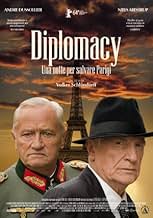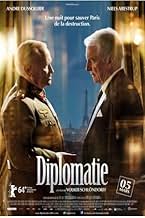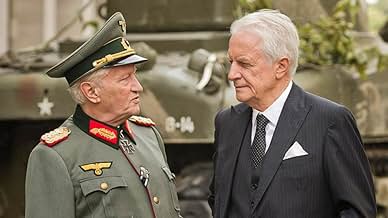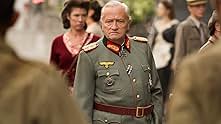PUNTUACIÓN EN IMDb
7,1/10
6,1 mil
TU PUNTUACIÓN
Drama histórico que retrata la relación entre Dietrich von Choltitz, gobernador militar alemán del París ocupado, y el cónsul general sueco Raoul Nordling.Drama histórico que retrata la relación entre Dietrich von Choltitz, gobernador militar alemán del París ocupado, y el cónsul general sueco Raoul Nordling.Drama histórico que retrata la relación entre Dietrich von Choltitz, gobernador militar alemán del París ocupado, y el cónsul general sueco Raoul Nordling.
- Dirección
- Guión
- Reparto principal
- Premios
- 5 premios y 6 nominaciones en total
Pierre-Marie Rochefort-Schneider
- Opérateur radio
- (as Pierre-Marie Rochefort)
Reseñas destacadas
Cyril Gély's play 'Diplomatie' opened at the Théatre de la Madeleine in 2011 with Niels Arestrup as Dietrich von Choltitz and André Dusollier as Raoul Nordling. It ran for three hundred performances so both actors certainly had long enough to get it right! Although the ways of Film are mysterious, when it came time to adapt the piece for the screen they were obvious choices and luckily for us they were able to reprise their roles.
The relationship between the characters of von Choltitz, Governor-General of occupied Paris and Swedish consul Nordling had been touched upon in René Clément's sprawling and star-studded epic 'Is Paris burning?' in which they were played by Gert Frobe and Orson Welles. They met on several occasions but for the dramatic purposes of the play Gély depicts one fictional meeting that takes place in the L'Hotel Meurice on the Rue de Rivoli just hours before von Choltitz is due to carry out Hitler's order to destroy Paris rather than let it to fall into the hands of the advancing Allies.
Here, as opposed to the earlier film, the emphasis is on individual rather than collective action. The means by which Nordling allegedly convinces the hard-nosed and brutal General to rescind Hitler's maniacal order are of course purely hypothetical but results in excellent theatre. Presumably Gély had access to the General's memoirs but how reliable are these one wonders? There are some who have suggested that von Choltitz is merely motivated by the desire to save his own skin, knowing that his previous military actions in Rotterdam and Sevastopol would mark him out as a war criminal(in fact he only served two years in prison) and that anyway, he lacked sufficient time and resources to carry out the order effectively. What is plausible and very much in keeping with the characters is that Nordling promises to get von Choltitz' wife and children out of Germany and into safety in Switzerland if he surrenders the city. It is known than Choltitz had previously refused to obey Himmler's order to ransack the Louvre so already the seeds of defiance were being sewn and like so many officers of the Wehrmacht he had serious doubts about Hitler's sanity. Perhaps after all Nordling wasn't required to do too much persuading.
As for the film Volker Schloendorff has done a marvellous job in sustaining our interest in what is essentially a two-hander. The camerawork of Michel Amathieu is excellent and although shot in colour the contrasts between light and dark aid the drama immeasurably. The director mainly keeps the action within the proscenium arch but a filmically effective scene is where von Choltitz rescinds the order whilst on the roof of the hotel so that both he and the audience have the panorama of Paris in view.
Schloendorff has achieved a perfect balance here between film and filmed theatre and has the advantage in Arestrup and Dusollier of two consummate professionals at the top of their game.
Seventy-five years on it is difficult to appreciate just how close Paris came to destruction. One would dearly love to believe that Nordling's arguments won the day as it gives us a feeling that maybe, just maybe, 'the strength of one in tongue and speech is mightier than all fighting.' We live in hopes!
The relationship between the characters of von Choltitz, Governor-General of occupied Paris and Swedish consul Nordling had been touched upon in René Clément's sprawling and star-studded epic 'Is Paris burning?' in which they were played by Gert Frobe and Orson Welles. They met on several occasions but for the dramatic purposes of the play Gély depicts one fictional meeting that takes place in the L'Hotel Meurice on the Rue de Rivoli just hours before von Choltitz is due to carry out Hitler's order to destroy Paris rather than let it to fall into the hands of the advancing Allies.
Here, as opposed to the earlier film, the emphasis is on individual rather than collective action. The means by which Nordling allegedly convinces the hard-nosed and brutal General to rescind Hitler's maniacal order are of course purely hypothetical but results in excellent theatre. Presumably Gély had access to the General's memoirs but how reliable are these one wonders? There are some who have suggested that von Choltitz is merely motivated by the desire to save his own skin, knowing that his previous military actions in Rotterdam and Sevastopol would mark him out as a war criminal(in fact he only served two years in prison) and that anyway, he lacked sufficient time and resources to carry out the order effectively. What is plausible and very much in keeping with the characters is that Nordling promises to get von Choltitz' wife and children out of Germany and into safety in Switzerland if he surrenders the city. It is known than Choltitz had previously refused to obey Himmler's order to ransack the Louvre so already the seeds of defiance were being sewn and like so many officers of the Wehrmacht he had serious doubts about Hitler's sanity. Perhaps after all Nordling wasn't required to do too much persuading.
As for the film Volker Schloendorff has done a marvellous job in sustaining our interest in what is essentially a two-hander. The camerawork of Michel Amathieu is excellent and although shot in colour the contrasts between light and dark aid the drama immeasurably. The director mainly keeps the action within the proscenium arch but a filmically effective scene is where von Choltitz rescinds the order whilst on the roof of the hotel so that both he and the audience have the panorama of Paris in view.
Schloendorff has achieved a perfect balance here between film and filmed theatre and has the advantage in Arestrup and Dusollier of two consummate professionals at the top of their game.
Seventy-five years on it is difficult to appreciate just how close Paris came to destruction. One would dearly love to believe that Nordling's arguments won the day as it gives us a feeling that maybe, just maybe, 'the strength of one in tongue and speech is mightier than all fighting.' We live in hopes!
Diplomacy (2014)
Blow up Paris? Notre Dame, the Eiffel Tower, the Louvre? Yes—almost. And for real. It's 1944.
In the final days (or day) of the German occupation of Paris, as the Allies were moving very quickly in, the Germans (under Hitler's orders) were increasingly desperate. And bitter. They were going to leave the lovely city in ruins—you know that kind of baby attitude, if I can't have it you can't have it either.
Well, we know that Paris was not blown up. (The city famously survived the truly brutal World War II with hardly a scratch, compared to the rest of Europe.) And the final decision —to do it or not—fell to one man, ultimately, aging commanding German General Choltitz. And a man appears in his quarters who we learn is the Swedish diplomat Raoul Nordling. Nordling sees the crisis, and sees the general's quandary, and has to find a way to stop the madness.
And so we have a condensed version of some very real events. The movie is based on a play which by necessity distilled this down to mostly these two characters in their hotel, though we are given a convincing sense of the city and the Germans around the hotel.
This is high drama in its purest simplest form—conversation. The men try to understand each other. The general knows the Swede is trying to persuade him, and the Swede knows the general is under orders that can't be defied. There is the moment, and then there is history, and how the world will later look on the moment. And it all is spelled out with such delicious economy and psychology, it's riveting.
And even though you know that Paris survives, you won't know why or how, or how close it came to rubble, until you see this.
Blow up Paris? Notre Dame, the Eiffel Tower, the Louvre? Yes—almost. And for real. It's 1944.
In the final days (or day) of the German occupation of Paris, as the Allies were moving very quickly in, the Germans (under Hitler's orders) were increasingly desperate. And bitter. They were going to leave the lovely city in ruins—you know that kind of baby attitude, if I can't have it you can't have it either.
Well, we know that Paris was not blown up. (The city famously survived the truly brutal World War II with hardly a scratch, compared to the rest of Europe.) And the final decision —to do it or not—fell to one man, ultimately, aging commanding German General Choltitz. And a man appears in his quarters who we learn is the Swedish diplomat Raoul Nordling. Nordling sees the crisis, and sees the general's quandary, and has to find a way to stop the madness.
And so we have a condensed version of some very real events. The movie is based on a play which by necessity distilled this down to mostly these two characters in their hotel, though we are given a convincing sense of the city and the Germans around the hotel.
This is high drama in its purest simplest form—conversation. The men try to understand each other. The general knows the Swede is trying to persuade him, and the Swede knows the general is under orders that can't be defied. There is the moment, and then there is history, and how the world will later look on the moment. And it all is spelled out with such delicious economy and psychology, it's riveting.
And even though you know that Paris survives, you won't know why or how, or how close it came to rubble, until you see this.
I got the chance to see "Diplomacy" last night at the Angelika in Dallas, and I was pleasantly surprised by how much I liked it. Twenty minutes into it, I saw where the movie was heading, the set up of it, and enjoyed every minute. The movie is a shining light on the wisdom, gentleness, and burden of age and power. Two elderly men are grappling, albeit with very different styles, over the future of Paris and its iconic treasures. It's a snapshot of history that I never saw, and holds a profound depth I won't forget.
The play-turned-movie is the story of the general in charge of the Nazi Occupation of Paris, and the Swedish diplomat who has a passing relationship with the man when the play begins. All of Paris' great architectural treasures are to be destroyed to buy time for the retreat of the Nazi army across France, and it's only a matter of hours before the order is given. The Swedish diplomat in his powerful and sly persuasive style takes on the general in trying to dissuade him through some of the most artful, intelligent and brilliant rhetoric I've seen in a movie. In many ways the film feels like a boxing match, a final scene in a Rocky movie between an underdog boxer and his strong but weary opponent who seemingly has no weaknesses.
There is both the German and French culture's strengths and weaknesses on display (even though the diplomat represents Sweden he openly says that Paris has embraced her and she him). I love this sort of contrast, particularly in showing that Germans have a softer side that's deep and valuable to them, and the French have a gristly fighting spirit that was formidable and feared up to this day; unfortunate stereotypes for both cultures. I read a quora article today about how the French didn't flee the Germans, they fought but in the WWI style that was ineffective against the Blitzkrieg (now adopted by all modern militaries in the world today). We also forget the British lost to the Germans shortly afterward, and were driven back to their island.
The movie feels like a play, which I would somewhat fault it for in some ways, but it doesn't become a distraction or take away from the film. Also the movie seems small at times, with 90% of the dialog happening in one room in a hotel where the Nazi general works. Granted, this is likely due to the low budget and it does help the motif of the movie being about the power these two men have over the fate of Paris.
This movie falls in line with a string of films lately that could almost make a genre itself: the artist/culturally sensitive figure fighting to preserve and save artistic treasures amidst a raging battle. "Monuments Men" and "The Train" come to mind immediately.
I can't help but think of all the destruction caused by wars, the Abbey at Monte Cassino being one, as well as several that we're seeing in the Middle East. I remember reading about how many important buildings and museums were threatened and attempted to be preserved as the US army went through Iraq.
Historical treasures that are destroyed by war is one of the greatest arguments against it, its chaos and disregard for what's most valuable in the world. A broader theme though is the value of an entire culture and its history, and how often war and strife easily take those down, possibly because they're so prominent and essential to a city's character. Coming from a country like the US, I don't have as acute a sense of this as those who live in Europe, but there is still something in humanity in which we are drawn to monumental art, and value it as more than just a tourist site. Paris is an easy example of this.
The movie is worth seeing, and it's quaint in its setting, and beams a sense of humility which is refreshing when movies in our time seem to fight to be the biggest (though the consequences of the decisions made in the movie are massive). It's where live theater has something to offer the world of movies, a kind of depth through being as small as possible.
The play-turned-movie is the story of the general in charge of the Nazi Occupation of Paris, and the Swedish diplomat who has a passing relationship with the man when the play begins. All of Paris' great architectural treasures are to be destroyed to buy time for the retreat of the Nazi army across France, and it's only a matter of hours before the order is given. The Swedish diplomat in his powerful and sly persuasive style takes on the general in trying to dissuade him through some of the most artful, intelligent and brilliant rhetoric I've seen in a movie. In many ways the film feels like a boxing match, a final scene in a Rocky movie between an underdog boxer and his strong but weary opponent who seemingly has no weaknesses.
There is both the German and French culture's strengths and weaknesses on display (even though the diplomat represents Sweden he openly says that Paris has embraced her and she him). I love this sort of contrast, particularly in showing that Germans have a softer side that's deep and valuable to them, and the French have a gristly fighting spirit that was formidable and feared up to this day; unfortunate stereotypes for both cultures. I read a quora article today about how the French didn't flee the Germans, they fought but in the WWI style that was ineffective against the Blitzkrieg (now adopted by all modern militaries in the world today). We also forget the British lost to the Germans shortly afterward, and were driven back to their island.
The movie feels like a play, which I would somewhat fault it for in some ways, but it doesn't become a distraction or take away from the film. Also the movie seems small at times, with 90% of the dialog happening in one room in a hotel where the Nazi general works. Granted, this is likely due to the low budget and it does help the motif of the movie being about the power these two men have over the fate of Paris.
This movie falls in line with a string of films lately that could almost make a genre itself: the artist/culturally sensitive figure fighting to preserve and save artistic treasures amidst a raging battle. "Monuments Men" and "The Train" come to mind immediately.
I can't help but think of all the destruction caused by wars, the Abbey at Monte Cassino being one, as well as several that we're seeing in the Middle East. I remember reading about how many important buildings and museums were threatened and attempted to be preserved as the US army went through Iraq.
Historical treasures that are destroyed by war is one of the greatest arguments against it, its chaos and disregard for what's most valuable in the world. A broader theme though is the value of an entire culture and its history, and how often war and strife easily take those down, possibly because they're so prominent and essential to a city's character. Coming from a country like the US, I don't have as acute a sense of this as those who live in Europe, but there is still something in humanity in which we are drawn to monumental art, and value it as more than just a tourist site. Paris is an easy example of this.
The movie is worth seeing, and it's quaint in its setting, and beams a sense of humility which is refreshing when movies in our time seem to fight to be the biggest (though the consequences of the decisions made in the movie are massive). It's where live theater has something to offer the world of movies, a kind of depth through being as small as possible.
My wife and I went to see this film a few days ago, I loved it. Excellent acting! I find the title, "Diplomatie" to fit in very well with the observation that the Swedish diplomat clearly had no intention whatever to honour his promises to the German general (i.e. to take care of his family in mortal danger of suppression by the Nazi establishment). In other words, my reading is that diplomatic practice apparently provides the practitioner of that particular political act the green light to do whatever he deems necessary to reach the objective of the "raison d'état", not excluding playing on emotions or even outright lying. Not a pretty observation. Is it correct? Neither am I convinced the film is to be taken as historically correct: the decision not to destroy Paris was the result of a balanced appraisal of the fact that it was not the communists (resistance) that liberated Paris, but ...Spanish... troops in the service of General De Gaulle executing an agenda not quite in line with American instructions. Comme quoi History is often written with a small "h".
This is a brilliant film.
Masterfully set in the tense historical and ideally theatrical moment, the story demonstrated that the combination of the power of the iron will and the eloquent linguistic skills, both built on the trust of the two human beings, was able to defy something impossible.
From the linguistic point of view, the film was made very realistic, switching between German and French. This is a relief, given a flood of supposedly European movies of recent with a way too many English speaking characters.
I want my children to watch this film to eyewitness the history and perhaps something more important than that: Words, not the sword, saved Paris and her people from calamity.
Masterfully set in the tense historical and ideally theatrical moment, the story demonstrated that the combination of the power of the iron will and the eloquent linguistic skills, both built on the trust of the two human beings, was able to defy something impossible.
From the linguistic point of view, the film was made very realistic, switching between German and French. This is a relief, given a flood of supposedly European movies of recent with a way too many English speaking characters.
I want my children to watch this film to eyewitness the history and perhaps something more important than that: Words, not the sword, saved Paris and her people from calamity.
¿Sabías que...?
- Citas
Général von Choltitz: Do you know what we do to men like you?
Raoul Nordling: Give them a medal?
Général von Choltitz: [breaking a smile] Yes, on occasion.
[stern again]
Général von Choltitz: Posthumously.
- ConexionesFeatured in Diplomatie: Making of (2015)
- Banda sonoraLa 7ème symphonie
Music by Ludwig van Beethoven (as Beethoven)
Conducted by Wilhelm Furtwängler
Berlin 1943 © Société Wilhelm Furtwängler
Performed by Berliner Philharmoniker (uncredited)
Selecciones populares
Inicia sesión para calificar y añadir a tu lista para recibir recomendaciones personalizadas
- How long is Diplomacy?Con tecnología de Alexa
Detalles
- Fecha de lanzamiento
- Países de origen
- Sitio oficial
- Idiomas
- Títulos en diferentes países
- Diplomàcia
- Localizaciones del rodaje
- Jardin des Tuileries, Paris 1, París, Francia(city park in front of the hotel)
- Empresas productoras
- Ver más compañías en los créditos en IMDbPro
Taquilla
- Recaudación en Estados Unidos y Canadá
- 230.880 US$
- Fin de semana de estreno en EE. UU. y Canadá
- 8518 US$
- 19 oct 2014
- Recaudación en todo el mundo
- 4.207.242 US$
- Duración1 hora 24 minutos
- Color
- Mezcla de sonido
- Relación de aspecto
- 2.35 : 1
Contribuir a esta página
Sugerir un cambio o añadir el contenido que falta




























